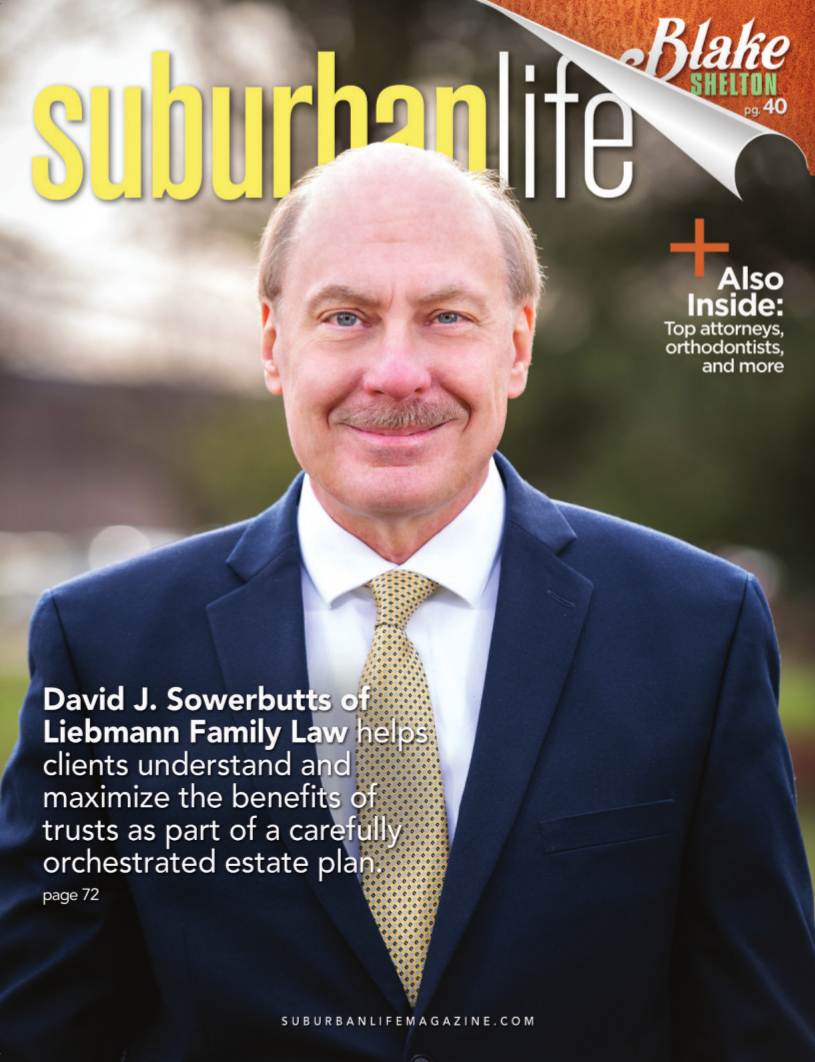
A Matter of Trust
David J. Sowerbutts of Liebmann Family Law helps clients understand and maximize the benefits of trusts as part of a carefully orchestrated estate plan.
David J. Sowerbutts may be an attorney first and foremost, but he’s also an educator of sorts—particularly when it comes to trusts. He understands that many people are unfamiliar with trusts, and as a result they overlook the potential benefits they can provide.
Sowerbutts is an attorney with Liebmann Family Law in Bucks County. Like his fellow attorneys in the firm, Jeffrey A. Liebmann and Mindy J. Snyder, his practice includes helping people contend with issues pertaining to divorce, custody, and support. At the same time, he has garnered expertise in matters tied to estate planning, including trusts.
As Sowerbutts explains it, a trust is a written legal agreement created with the goal of helping a beneficiary curate and preserve wealth responsibly and with the assistance of a third party, or trustee.
“One very common trust is used for minor children or any minor beneficiary of a will,” he says. “In most instances, if a parent or guardian is creating a will, that person generally won’t want to leave an estate to a person under 18. Instead, I create a provision that any beneficiary won’t get the entirety of an estate outright; instead, the estate goes into a trust until the beneficiary is 25 years old.”
Before the beneficiary reaches that age, the trust can be used to fund the health, education, and support of the trust beneficiary.
“In most instances,” he continues, “a parent will create a trust in a will for a child, appointing a responsible person to administer the money to make sure the child has proper housing, medical attention, transport to and from school, and food, for example. Then, at age 25, the trust terminates and whatever is left in the trust, the child receives outright.”
Oftentimes with large estates, the trust can extend beyond age 25 to age 30, 35, or even 40. In these cases, Sowerbutts suggests so-called “sprinkle provisions” can be included. These release a certain percentage of an estate at precise intervals until the trust terminates, at which point the beneficiary would receive the entirety of the remaining estate.
Trusts can also benefit individuals who have special needs. This is particularly true if the beneficiary is receiving vital public assistance, according to Sowerbutts.
“A special needs trust, also known as a supplemental needs trust, can be created specifically for the benefit of a person receiving public assistance or social security disability income,” he adds. “If an inheritance is not in a special needs trust, the inheritance may have to be completely or nearly spent down before the beneficiary can be eligible for assistance again.”
Devised with the goal of supplementing and improving the quality of life for the beneficiary, a special needs trust can supplement the aid a beneficiary receives from certain programs without disqualifying that individual for government assistance.
There are two main ways such a trust can be set up, Sowerbutts explains. One is by the individual, using his or her own money (for example, if an individual receives a large sum from the settlement of an auto accident); this is known as a first party, or self-funded, special needs trust. A third party can also set up a special needs trust for a beneficiary—perhaps a relative who wants to donate money now to improve the beneficiary’s quality of life, or name a beneficiary in a will to receive money later.
Other types of trusts include revocable and irrevocable trusts, though neither are as commonly used in Pennsylvania.
“When you have a will, an executor needs to be formally appointed by the court so that person has the ability to administer assets and affairs for the decedent, by going through probate—the process of presenting the will to the court, and having the court validate it,” he says. “In some states, the probate process is difficult. It can entail multiple trips to court, potentially hearings, and in states where the process is more difficult, a revocable trust can avoid the probate process. In Pennsylvania, we are fortunate that the probate process is very simple and straightforward. This is why wills, and not revocable trusts, are more commonly used in Pennsylvania for estate planning.”
Sowerbutts cautions that a revocable trust encompasses requirements such as retitling all assets into the name of the revocable trust—cars, bank accounts, houses—and legal fees are generally higher. As the trust is “revocable,” the author of the will can amend, change, or revoke it at any time; then at the time of the death of the settlor (trust creator), all involved parties must follow the rules set out in the revocable trust.
Even with revocable trusts, most times an individual will craft a “pour-over will” anyway, as a safety net to encompass anything that may have been left out of the officially registered assets appointed to the revocable trust.
Irrevocable trusts are also options, but once a person transfers an asset into the trust, that asset is no longer the property of the testator; the asset is then owned by the trust. Sowerbutts suggests there are limited circumstances when irrevocable trusts are good tools in the estate planning process, but they require greater care and planning because of the lack of ownership that ensues.
That said, all estate planning should be done with utmost care and forethought.
“Estate planning is critical even if no trust is involved,” Sowerbutts says. “If you have children, it is extremely critical, not just to protect money for a child but also to pick a guardian for the child. If there is no will, a court will have to decide.”
Additionally, without a will, any funds to which a child is entitled go into a restricted account only until the child becomes an adult. The rules governing disbursement from that account are “somewhat cumbersome and can require court approval,” Sowerbutts says.
“At age 18, a child is deciding on college, then possibly graduate school, and it’s not the best time for a child to have a large sum of money,” he adds. “A large sum of money can influence a child in an irresponsible way.”
Like most fields in the modern era, law is trending toward specialization. For this reason, Sowerbutts cautions against relying on a legal practitioner who does not have expertise in estate matters.
“I’ve taken time over the years, decades, to expand my knowledge and acquire more and more experience,” he says. “This allows me to give a higher level of advice to clients. Honestly, one of the things I like best about being a lawyer is that I get to learn something new every day, and this area of law affords the opportunity to do that.”
Liebmann Family Law
The Atrium
4 Terry Drive, Suite 4
Newtown, PA 18940
(215) 860-8200
Photograph by Jeff Anderson
Published (and copyrighted) in Suburban Life magazine, July 2021.



